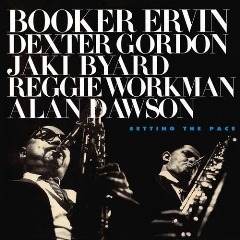Bass player Noah Jackson has only been a professional jazz musician little under a year. And Jackson has already put out his first album Contemplations: A Suite, which will be tops on I Dig Jazz’s best jazz albums of 2011 list. Jackson is 22-year-old. He’s a husky fellow with gentlemanly disposition, and he uses good grammar.
Jackson lives in New York now. He's a graduate student at the Manhattan Institute of Music. And Jackson is getting his name out there running the streets with the jazz quartet the Misfits. Before Jackson moved from Detroit to New York, he held the bass chair in the jazz ensemble Planet D Nonet. Jackson's played on the nonet's albums Ballads, Blues & Beyond, Blowin' Away the Blues, and We Travel the Spaceways.
On the bass, Jackson has an aggressive sound like jazz bass players Rodney Whitaker and the late Don Mayberry. Jackson becomes animated when he’s soloing. Beads of sweat collects on his forehead, and he rises on his tiptoes when hitting certain musical notes.
In 2010, Jackson graduated from Michigan State University. Jackson played the compositions on Contemplations at his senior recital. The recital was successful. Some friends encouraged Jackson to record the suite. Jackson hustled up the money, and a friend, who's a recording engineer, gave Jackson a deal on the studio time needed to completed the project.
Save for Jackson work with the Planet D Nonet, he has a traditional jazz background. But, surprisingly, Contemplations has a free jazz and a contemporary jazz feel.
“ I didn't intend for the album to come across as free jazz. I think people can relate to it because it has a good rhythmic pulse,” Jackson said.
I Dig Jazz spoke with Jackson about the album’s evolution days before the official album release party at Cliff Bell’s in downtown Detroit.
You’re just getting your feet wet as a professional jazz musician. Why did you release your debut album so early in your career?
NJ: Why not? I mean there's only one way to be ready, and that is just to do it. I never felt like I had to do this album. But, things lead up to the point where I had to make it.
How did Contemplations come about?
NJ: I did the whole suite as my senior recital at Michigan State. I got an overwhelming positive response from the recital, and some people told me that I should record it.
I’m glad you listened.
NJ: I have a good friend who runs a recording studio outside of Lansing, and he made it possible for me to make the album. Contemplations started as a collection of themes and ideas that I wrote over a period of time. It wasn't written as a suite. It was five different pieces that I wrote the music so it would have this nice logical progression.
The first tune that I wrote, which is independent from the other tunes was the ballad My Reflection. I wrote that a year ago, and everything else I wrote after that. I just kind of put things together and it worked out very well.
 |
| Bassist Noah Jackson |
Contemplations has a free jazz feel. That shocked me because you have a straight-ahead jazz background.
Because Michigan State is such a straight-ahead school, I didn't want to deviate from that because I'm a straight-ahead guy at heart. I wanted to do something a little bit different and unique that had a distinct sound. The album has a free jazz vibe to it. But it not free jazz.
What category of jazz does Contemplations fit?
If you have to put it in a box, I would say it's contemporary jazz. It has a contemporary sound, but it doesn't stray away from harmony and melody. I don't consider it a perfect package, but the album is something that people can listen to and enjoy and make it their own.
The band is tighter than a banjo string. How long have you performed with the musicians on the albums Anthony Stanco, Marcus Miller, Walter Harris III, Ryan Goh, and Ryan Ptasnick?
NJ: I've played with them all for many, many years. But the recital and the recording was the first time we all played together.
Where are you headed musically?
NJ: I not know. I had a lot of fun playing the music on Contemplations. But I'm still a huge disciple of swing, and that's never going to change anytime soon. I want to add to that. I really enjoy post bop hard bop and swing. That's my bread and butter.
At the end of the day, I still want to play with Sonny Rollins, Wayne Shorter. Their careers obviously went in a different direction and people still respect their art. I don't necessarily want to be in that same circle. I want to be of the mindset of constantly changing and not being pigeonholed as one type of musician.
You’ve put a good product on the market.
NJ: I didn't what to shortchange anybody. I didn't want to take the audience for granted, and give them a product that I didn't believe in. If I believe in something, I'm going to do it right. I’m still a work in progress. The album is a stepping-stone. The album is something that I want to improve on. When I mature more as a musician, and when I stretch higher I will have this album to rely on to make the next album even better.













